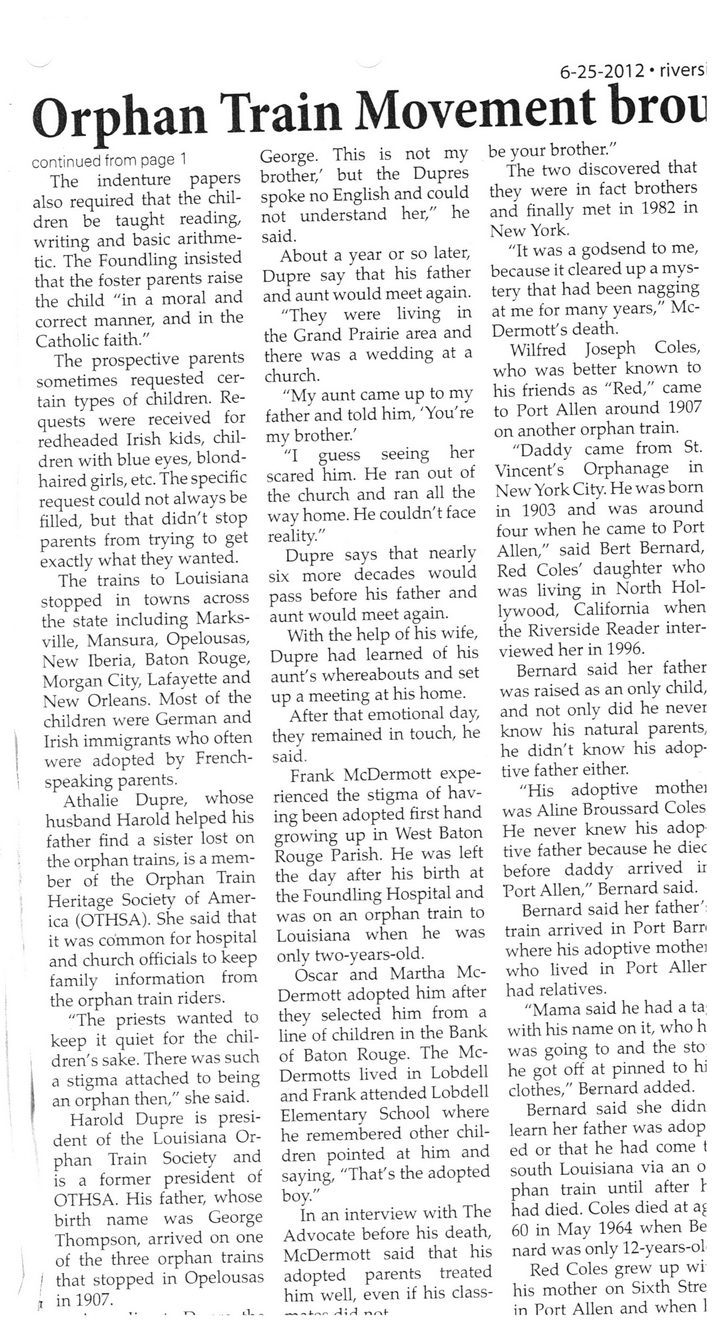This text was obtained via automated optical character recognition.
It has not been edited and may therefore contain several errors.
6-25-2012 • rivers Orphan Train Movement brou continued from page 1 The indenture papers also required that the children be taught reading, writing and basic arithmetic. The Foundling insisted that the foster parents raise the child "in a moral and correct manner, and in the Catholic faith." The prospective parents sometimes requested certain types of children. Requests were received for redheaded Irish kids, children with blue eyes, blondhaired girls, etc. The specific request could not always be filled, but that didn't stop parents from trying to get exactly what they wanted. The trains to Louisiana stopped in towns across the state including Marks-ville, Mansura, Opelousas, New Iberia, Baton Rouge, Morgan City, Lafayette and New Orleans. Most of the children were German and Irish immigrants who often were adopted by French-speaking parents. Athalie Dupre, whose husband Harold helped his father find a sister lost on the orphan trains, is a member of the Orphan Train Heritage Society of America (OTHSA). She said that it was common for hospital and church officials to keep family information from the orphan train riders. "The priests wanted to keep it quiet for the children's sake. There was such a stigma attached to being an orphan then," she said. Harold Dupre is president of the Louisiana Orphan Train Society and is a former president of OTHSA. His father, whose birth name was George Thompson, arrived on one of the three orphan trains that stopped in Opelousas in 1907. George. This is not my brother,' but the Dupres spoke no English and could not understand her," he said. About a year or so later, Dupre say that his father and aunt would meet again. "They were living in the Grand Prairie area and there was a wedding at a church. "My aunt came up to my father and told him, 'You're my brother.' "I guess seeing her scared him. He ran out of the church and ran all the way home. He couldn't face reality." Dupre says that nearly six more decades would pass before his father and aunt would meet again. With the help of his wife, Dupre had learned of his aunt's whereabouts and set up a meeting at his home. After that emotional day, they remained in touch, he said. Frank McDermott experienced the stigma of having been adopted first hand growing up in West Baton Rouge Parish. He was left the day after his birth at the Foundling Hospital and was on an orphan train to Louisiana when he was only two-years-old. Oscar and Martha McDermott adopted him after they selected him from a line of children in the Bank of Baton Rouge. The McDermotts lived in Lobdell and Frank attended Lobdell Elementary School where he remembered other children pointed at him and saying, "That's the adopted bov." j In an interview with The Advocate before his death, McDermott said that his adopted parents treated him well, even if his class- be your brother." The two discovered that they were in fact brothers and finally met in 1982 in New York. "It was a godsend to me, because it cleared up a mystery that had been nagging at me for many years," McDermott's death. Wilfred Joseph Coles, who was better known to his friends as "Red," came to Port Allen around 1907 on another orphan train. "Daddy came from St. Vincent's Orphanage in New York City. He wras bom in 1903 and was around four when he came to Port Allen," said Bert Bernard, Red Coles' daughter who was living in North Hollywood, California when the Riverside Reader interviewed her in 1996. Bernard said her father was raised as an only child, and not only did he never know his natural parents, he didn't know his adoptive father either. "His adoptive mothe] was Aline Broussard Coles He never knew his adop tive father because he diec before daddy arrived ii Port Allen," Bernard said. Bernard said her father': train arrived in Port Barn where his adoptive mothei who lived in Port Aller had relatives. "Mama said he had a ta with his name on it, who h was going to and the sto he got off at pinned to hi clothes," Bernard added. Bernard said she didn learn her father was adop ed or that he had come t south Louisiana via an o phan train until after \ had died. Coles died at a£ 60 in May 1964 when Be nard was only 12-years-ol Red Coles grew up wi his mother on Sixth Stre in Port Allen and when 1

Orphan Train Riders of BSL Document (152)